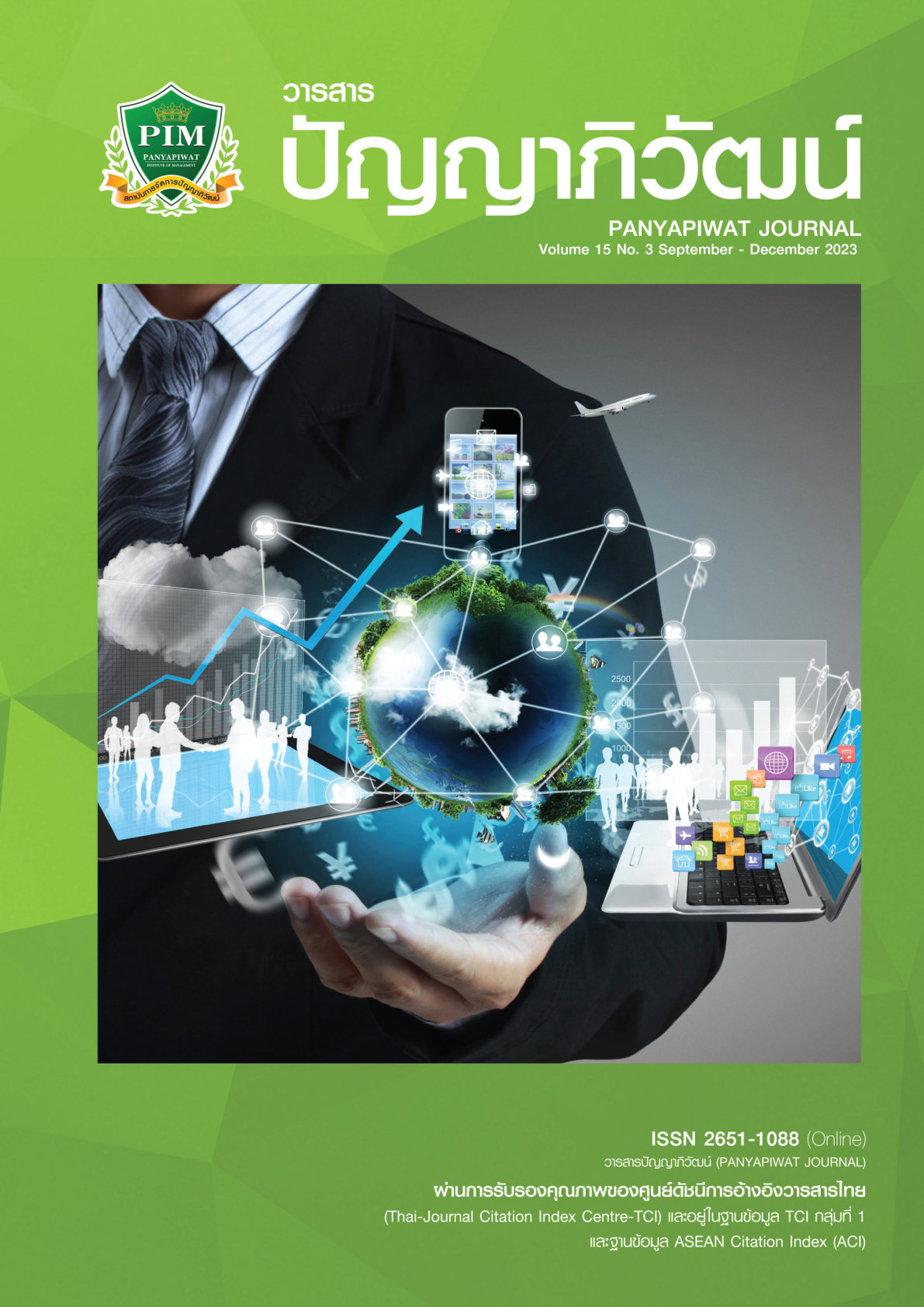การวิเคราะห์องค์ประกอบเชิงยืนยันของความสามารถในการเผชิญและฟันฝ่าอุปสรรคและความสามารถทางอารมณ์ของผู้ใหญ่วัยทำงานในมหาวิทยาลัยเอกชนในเขตกรุงเทพมหานคร
Main Article Content
บทคัดย่อ
การวิจัยครั้งนี้มีวัตถุประสงค์เพื่อวิเคราะห์องค์ประกอบเชิงยืนยันของความสามารถในการเผชิญและ ฟันฝ่าอุปสรรคของ Paul G. Stoltz และความสามารถทางอารมณ์ของ Daniel Goleman โดยใช้วิธีวิจัยเชิงสำรวจ เก็บข้อมูลโดยใช้แบบสอบถามจำนวน 45 ข้อ โดยมีค่าดัชนีความสอดคล้อง IOC อยู่ระหว่าง 0.66-1.00 และค่าความเชื่อมั่นเท่ากับ 0.95 จากกลุ่มผู้ใหญ่วัยทำงานในมหาวิทยาลัยเอกชนในเขตกรุงเทพมหานคร จำนวน 300 คน จากการสุ่มกลุ่มตัวอย่างอย่างง่าย (Simple Random Sampling) โดยเป็นผู้ที่สมัครใจให้ข้อมูลในการตอบแบบสอบถามออนไลน์ และทำการวิเคราะห์ข้อมูลโดยใช้สถิติบรรยาย (Descriptive Statistics) อธิบาย ข้อมูลด้วยค่าร้อยละ ค่ามัชฌิมเลขคณิต ค่าเบี่ยงเบนมาตรฐาน ใช้สถิติเชิงอนุมาน (Inferential Statistics) วิเคราะห์องค์ประกอบเชิงยืนยัน (Confirmatory Factor Analysis) ผลการวิจัยพบว่า การวิเคราะห์องค์ประกอบเชิ่งยืนยันของความสามารถในการเผชิญและฟันฝ่าอุปสรรคและความสามารถทางอารมณ์ของผู้ใหญ่วัยทำงานหลังจากปรับค่าความคลาดเคลื่อนระหว่างสองตัวแปรโดยใช้ค่าสถิติดัชนีการปรับโมเดลรวม จำนวน 17 คู่ผลวิเคราะห์แบบจำลองของความสามารถในการเผชิญและฟันฝ่าอุปสรรคและความสามารถทางอารมณ์มีความสอดคล้องกับข้อมูลเชิงประจักษ์อยู่ในเกณฑ์ดี โดยความสามารถในการเผชิญและฟันฝ่าอุปสรรคพบว่า ด้านการควบคุมมีน้ำหนักองค์ประกอบสูงที่สุด รองลงมาคือ ด้านการค้นหาสาเหตุและรับผิดชอบต่อปัญหา ด้านผลกระทบที่จะมาถึง และด้านความสามารถในการรับมือกับความยืดเยื้อของปัญหา ตามลำดับ ซึ่งมีความสอดคล้องกับข้อมูลเชิงประจักษ์ค่าน้ำหนักองค์ประกอบอย่างมีนัยสำคัญทางสถิติที่ระดับ 0.05 สำหรับความสามารถทางอารมณ์พบว่า ด้านการสร้างแรงจูงใจให้กับตนเองมีน้ำหนักองค์ประกอบสูงที่สุด รองลงมาคือ ด้านการเอาใจเขามาใส่ใจเรา ด้านการตระหนักรู้ในตนเอง ด้านการสร้านความสัมพันธ์กับผู้อื่น และด้านการควบคุมอารมณได้อย่างเหมาะสมตามลำดับ ซึ่งมีความสอดคล้องกับข้อมูลเชิงประจักษ์ค่าน้ำหนักองค์ประกอบอย่างมีนัยสำคัญทางสถิติที่ระดับ 0.05 เช่นเดียวกัน
Article Details

อนุญาตภายใต้เงื่อนไข Creative Commons Attribution-NonCommercial-NoDerivatives 4.0 International License.
“ข้าพเจ้าและผู้เขียนร่วม (ถ้ามี) ขอรับรองว่า บทความที่เสนอมานี้ยังไม่เคยได้รับการตีพิมพ์และไม่ได้อยู่ระหว่างกระบวนการพิจารณาลงตีพิมพ์ในวารสารหรือแหล่งเผยแพร่อื่นใด ข้าพเจ้าและผู้เขียนร่วมยอมรับหลักเกณฑ์การพิจารณาต้นฉบับ ทั้งยินยอมให้กองบรรณาธิการมีสิทธิ์พิจารณาและตรวจแก้ต้นฉบับได้ตามที่เห็นสมควร พร้อมนี้ขอมอบลิขสิทธิ์บทความที่ได้รับการตีพิมพ์ให้แก่สถาบันการจัดการปัญญาภิวัฒน์หากมีการฟ้องร้องเรื่องการละเมิดลิขสิทธิ์เกี่ยวกับภาพ กราฟ ข้อความส่วนใดส่วนหนึ่งและ/หรือข้อคิดเห็นที่ปรากฏในบทความข้าพเจ้าและผู้เขียนร่วมยินยอมรับผิดชอบแต่เพียงฝ่ายเดียว”
เอกสารอ้างอิง
Bollen, K. A. (1989). Structural equations with latent variables. John Wiley & Sons.
Browne, M. W., & Cudeck, R. (1993). Alternative ways of assessing model fit. In K. A. Bollen., & J. S. Long (Eds.), Testing structural equation models (pp. 136-162). Sage.
Department of Mental Health, Ministry of Public Health. (2019). Emotional quotient handbook. https://dmh.go.th/download/ebooks/EQ11.pdf [in Thai]
Diamantopoulos, A., & Siguaw, A. D. (2000). Introducing LISREL: A guide for the uninitiated. Sage Publications.
Durande-Moreau, A., & Usunier, J. (1999). Time styles and the waiting experience: An exploratory study. Journal of Service Research, 2(2), 173-186.
Goleman, D. (1998). Working with emotional intelligence. Bantam Books.
Gould, R. (1978). Transformation: Growth and change in adult life. Simon & Schuster.
Guntha, P. (2020). Emotional intelligence affecting quality of life of merchant marine cadets at Merchant Marine Training Centre [Master’s thesis]. Silpakorn University. [in Thai]
Hair, Jr., J. F., Black, W. C., Bain, B. J., & Anderson, R. E. (2006). Multivariate data analysis (7th ed.). Pearson Education International.
Harrison-Walker, J. (2001). The measurement of word-of-mouth communication and an investigation of service quality and customer commitment as potential antecedents. Journal of Service Research, 4(1), 60-75.
Hiranphicha, N. (2020). Effects of emotional quotient on service behaviors of secretaries in Rajamangala University of Technology Thanyaburi. Journal of Management and Development Ubon Ratchathani Rajabhat University, 7(2), 119-132. [in Thai]
Kline, R. B. (2011). Principles and practice of structural equation modeling (3rd ed.). The Guilford Press.
Levinson, D. J. (1978). The seasons of a man’s life. Random House Digital, Inc.
Mueller, R. O. (1996). Basic principles of structural equation modeling. An introduction to LISREL and EQS. Springer-Verlag.
Nakwatchara, W. (2001). How to treat your child to be smart good and happy IQ EQ MQ AQ (3rd ed.). Amarin Printing & Publishing.
Noklang, S., Srisuantang, S., & Tanpichai, P. (2015). A confirmatory factor analysis model of adversity quotient among third year students in the five-year teacher education course at Prince of Songkla University, Pattani Campus. Journal of Liberal Arts, Prince of Songkla University, Hat Yai Campus, 7(1), 109-125. [in Thai]
Office of the Higher Education Commission. (2018, May 20). Annual report 2017. http://www.info.mua.go.th/information/show_all_statdata_table.php?data_show=4 [in Thai]
Piamsuppasap, D. (2011). Emotional Quotient (EQ) Spiritual Quotient (SQ) influencing individual creativity: A case study of sport authority of Thailand (sat)’s officers [Master’s thesis]. Silpakorn University. [in Thai]
Phisankittikhun, T. (2015). Emotional quotient affecting work efficiency: A case study of employees in power system control and operation division, electricity generating authority of Thailand [Master’s thesis]. Silpakorn University. [in Thai]
Praditsaeng, M. (2016). Emotional intelligence and social intelligence of lecturers working in three provinces in southern Thailand (Research report). Office of the Higher Education Commission. [in Thai]
Schutte, N. S., & Malouff, J. M. (2011). Emotional intelligence mediates the relationship between mindfulness and subjective well-being. Personality and Individual Differences, 50, 1116-1117.
Sheehy, G. (1981). Pathfinders. William Morrow and Company, Inc.
Sorbon, D. (1996). LISREL 8: User’s reference guide. Scientific Software International.
Stoltz, P. G. (1997). Adversity quotient turning obstacles into opportunities. Wiley.
Suwannalarp, P. (2016). Adversity quotient, perception of organizational justice and turnover intention: A case study of sales staff of one airline company [Master’s thesis]. Thammasat University. [in Thai]
Thongsawat, N. (1994). Linear Structural Relationships (LISREL): Analytical statistics for social and behavioral science research. Chulalongkorn University Press. [in Thai]
Thongsawat, S., Rodprasert, P., & Chullasap, N. (2020). States, problems and developing guidelines of academic staffs organization commitment of the private universities in Thailand. Journal of Suvarnabhumi Institute of Technology (Humanities and Social Sciences), 6(2), 353-368. https://so04.tcithaijo.org/index.php/svittj/article/download/201393/166899 [in Thai]
Weisinger, H. (1998). Emotional intelligence at work: The untapped edge for success. Jossey-Bass.
Wiratchai, N. (1994). Linear Structural Relationships (LISREL): Analytical statistics for social and behavioral science research. Chulalongkorn University Printery. [in Thai]
Yuwanna, T., & Wacharayoo, P. (2014). The influence of adversity quotient and self-esteem towards production worker’s well-being in a packaging company. Journal of Social Sciences and Humanities Kasetsart University, 40(1), 147-165. https://so04.tci-thaijo.org/index.php/socku/article/view/79772 [in Thai]


